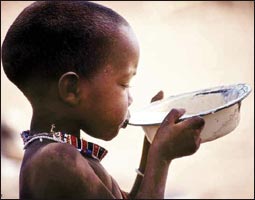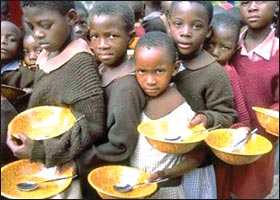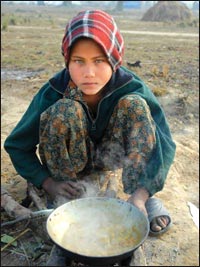|
Right to Food Act:
Essential but inadequate
Rahul Lahoti and Sanjay G. Reddy
There is an imbalance between the expansive vision expressed by the
draft Act and the narrow means it seeks to achieve it.
The Union Government’s draft Right to Food (Guarantee of Safety and
Security) Act insists on ‘the physical, economic and social right of all
citizens to have access to safe and nutritious food, consistent with an
adequate diet necessary to lead an active and healthy life with
dignity’. The proposed law offers a quantity of cereal at a modest cost
each month to a broad range of beneficiaries: in principle, all those
living under the poverty line and a range of others.
Imbalance
|

Drinking to the last drop |

Some throw away their bowls and spoons but for them these bowls
are all what they have to survive |
The recognition of a right to food (and therefore to freedom from
undernourishment and hunger) is a landmark measure and deserves great
credit. However, there is an imbalance between the expansive vision
expressed by the Act in principle and the narrow means it seeks to
achieve it in practice; reflected, for instance, in its focus only on
calories from food grains and on direct distribution rather than on the
provision of means for commanding food and on complementary policies. It
appears that the Act may not add much to the existing Public
Distribution System or State and Central programs to provide subsidized
cereals.
It appears very important to address the poor functioning of the
existing system, and to remedy both the apparent discrepancies across
States and the general non-transparency in the definition of the
beneficiaries (in particular, the ambiguities in the understanding of
what is a ‘Below Poverty Line’ household). It is also unclear how the
Act will be truly rights-based, in the sense that an individual may make
a binding demand for the satisfaction of the right.
A contrast can be drawn between an approach to further economic and
social rights which centres on the direct provision of essential goods
and one which ensures access to such goods through the creation of an
economy and society which produces and distributes these adequately in
the normal course. It is possible to fulfill such basic rights even at a
relatively low per-capita income by employing public action, but there
are advantages to combining both means in order to fulfill them in a
sustained way.
An approach focussed on the provision of subsidized resources can
play a vital role in protecting the poor and the vulnerable from
catastrophic outcomes, and can contribute to the establishment of a more
productive and healthy population that is capable of bringing about a
higher level of national development. It can serve ends which are both
intrinsically and instrumentally important.
However, such an approach is, in isolation, likely to be more costly,
less effective and face more political challenges to its maintenance,
than one which is supported by a larger program to generate remunerative
livelihoods and inclusive growth. A trajectory of national development
which brings about a widening circle of prosperity will both help ensure
that the right to food is fulfilled, and make it easier to provide
direct support wherever required.
The recent renewal of the Government’s focus on investment in
agriculture and rural development can be helpful in this regard, though
much more is required if there is to be a departure from the overly
concentrated pattern of recent economic growth which has centred
precipitously on a few islands of relative prosperity. Growth must occur
in a variety of sectors of production as well as geographical areas in
order to be socially inclusive. Inclusive growth may require broad-based
investment in human capabilities, public goods, productive
infrastructure and policies to broaden access to productive resources
such as land and credit.
A related distinction is between legislation seeking to promote or
protect a basic right and the strategy of doing so. The proposed Act
will help further the fulfillment of the right but will not by itself
achieve it, and it is unlikely that any one piece of legislation would
do so. Already, diverse pieces of legislation, including the National
Rural Employment Guarantee Act (NREGA), contribute in different and
important ways toward that end.
It should be ensured that these diverse measures together constitute
a layered social security system which protects various groups of
vulnerable people, going beyond the able-bodied poor to include the
elderly, the handicapped and children. As Amartya Sen has famously
underlined, starvation results from insufficient command over food and
not usually from inadequate food availability as such. Since command
over food is achieved in a diversity of ways, through the market
mechanism and otherwise, it can also fail in a variety of ways.
A broader strategy
|

Food scarcity has never been so badly felt for those who go
without a square meal for days |
The generation of adequate purchasing power is, however, a crucial
means to ensure food security in a market economy, which India
increasingly is. As such, in addition to protective measures such as the
NREGA, a broader strategy of inclusive growth, a generalized increase in
opportunity across the society, is the essential means to secure the
fulfillment of the right to food.
Such a strategy is the product of a range of Government actions and
cannot be fully enshrined in legislation, however important such
legislation may be. The framers of the Indian Constitution recognized
this in laying out the Directive Principles, which have an intermediate
role in the sense that they recommend a direction to the use of
sovereign power while declining to restrict it.
India continues to be a primarily agrarian society. The majority of
the people derive their livelihood directly or indirectly from
agriculture, even as the share of economic output generated by
agriculture has sharply diminished. It is important to observe that
agriculture, unique among sectors of production, plays the dual role of
providing an enormously important source of livelihood and of producing
the means of life. This dual role requires that it receive special
consideration.
India has traditionally espoused this view in global debates on trade
policy, and should place a similar perspective at the heart of domestic
public policy. Despite the relative stagnation of agricultural
productivity in recent years and evidence of continued widespread
undernourishment, as Indian society has become more urbanized and more
oriented toward non-agricultural activities, Indian agriculture has
largely kept pace with the growing domestic market demand for food.
India’s largest contribution to the fulfillment of the right to food
outside its borders may be that it has succeeded in doing so and thus
avoided competing with food-importing countries.
Its largest contribution to the fulfillment of the right to food
within its borders will be its embarking on a path of development which
reaches the mass of its people, thus making the Right to Food Act an
essential means but an ultimate irrelevance.
The Hindu |



